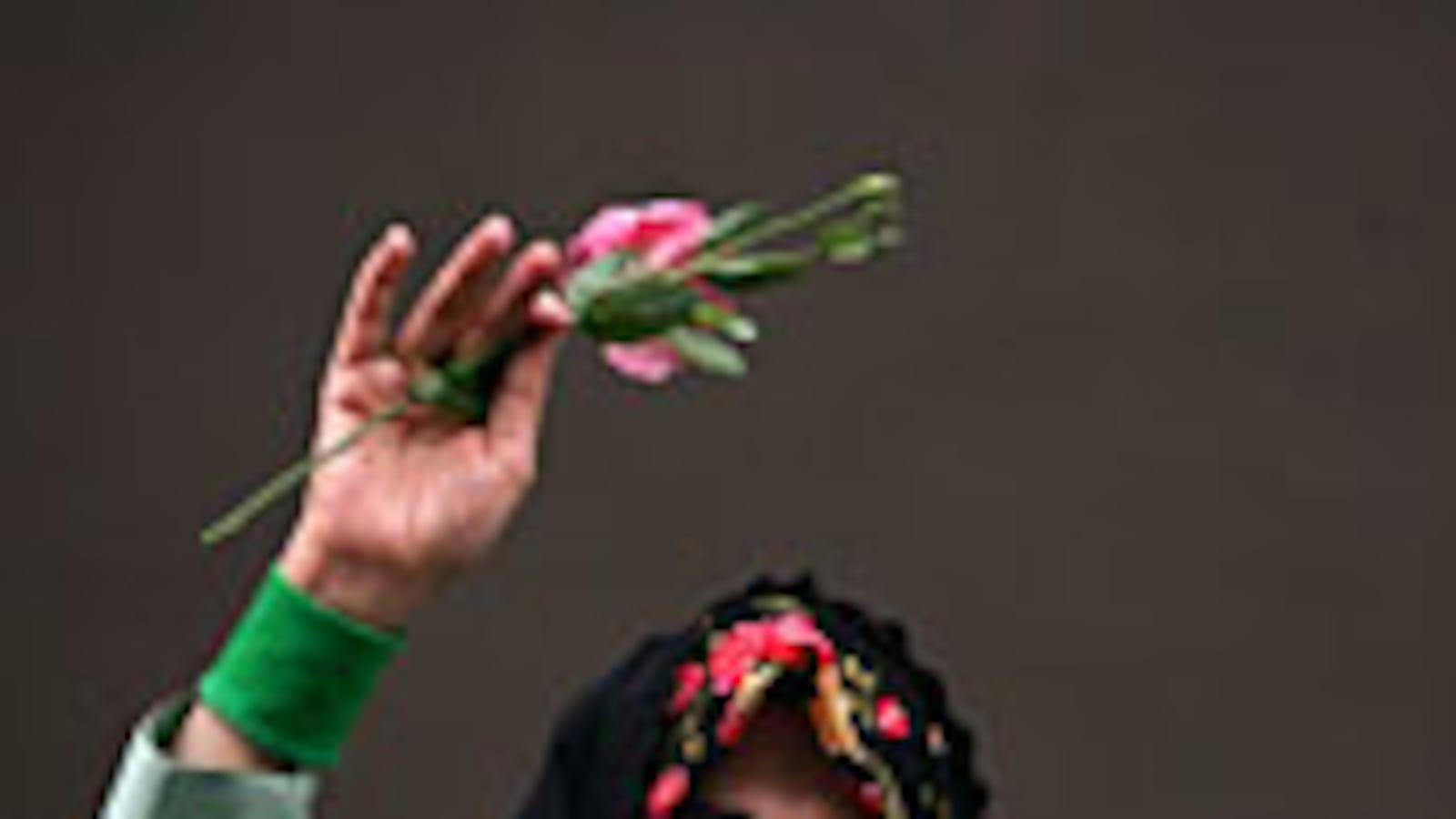
Plus, read more insight on Iran's election from other Daily Beast writers.
When I met Zahrah Rahnavard in Tehran on a hot July day in 1989, she was quick to assert her feminism.
“Please do not describe me as the prime mininster’s wife,” she said, rattling off her curriculum vitae as poet, playwright, essayist, university professor, and women’s rights activist. I asked her if her desire to be considered as an individual also explained why she was not wearing a wedding ring. No, she replied. That was because she considered wedding rings to be “frivolous ornaments” that had no place in the wardrobe of serious Muslim women. She was wearing a black chador pulled low on her forehead and tight across the lower part of her face. Lest anyone glimpse a toe beneath the floor-length robe, she wore thick black stockings under her sandals.
Rahnavard’s popularity on the stump goaded Ahmadinejad into attacking her during a televised debate with Mousavi, waving about what he claimed were her false academic credentials.
She told me she was dividing her time between two projects: drafting a law against wife abuse, which she said was rife in Iran, and work on a play. Its theme: Salman Rushdie as the true Satan in his book, The Satanic Verses.
Dr. Rahnavard’s husband, Mir Hussein Mousavi, is running against Mahmoud Ahmadinejad in Iran’s presidental elections. His campaign has ignited political fervor not seen in that country for years, with thousands of his supporters turning out for rallies in the countryside, forming human chains across the city of Tehran, and engaging in blisteringly honest debates about corruption and repression. Should he win tomorrow’s vote, Iran will have a new direction. But it will also have something it has not experienced since the Islamic revolution, and something that will be rare in the region: an outspoken and activist first lady.
Dr. Rahnavard has one or two things in common with our own first lady (aside from a husband whose middle name is Hussein), as well as Hillary Clinton before her. Impressively educated, with a master's in art and a Ph.D. in political science, she raised three daughters while pursuing a distinguished career, serving as a political adviser to former President Khatami, becoming the first female chancellor of a university since the Islamic revolution, and writing 15 books. (The best known of them, The Beauty of Concealment and the Concealment of Beauty, is available on Kindle.)
She has campaigned side-by-side with her husband, warming up the crowds at his rallies with her ardent speeches in favor of women’s rights and calls for “complete equality.” The two have even expressed affection in public by holding hands, which is considered shocking behavior even for married couples in many parts of the Muslim world.
Rahnavard’s prominence and popularity on the stump goaded Ahmadinejad into attacking her during a televised debate with Mousavi, waving about what he claimed were her false academic credentials. This was widely seen as a faux pas in a culture where a man rarely mentions another’s wife by name. Rahnavard’s response was swift and rather Western: She threatened to sue.
But let’s not get carried away. Zahra Rahnavard’s feminism is defined by her Islamic radicalism: Ahmadinejad’s Holocaust denial is wrong, but Israel shouldn’t exist. Women may be equal, but they must be veiled. Not that Rahnavard herself always has been. Tehranis remember her as a miniskirted art student in the 1970s, campaigning against the shah. When she became an Islamic revolutionary, the chador was all about powerful semiotics. It was, as she put it, “our trench against Western values.” It was also “a symbol of resistance” to a way of life where Americans used the bodies of their daughters to sell cars.
While her husband has repented some of the excesses of his militant years, she too has lightened up a little, often wearing floral head scarves and letting her chador billow loosely around her face and body instead of pulling it tight. But there will be no miniskirts, no bare biceps from this first lady. She says she believes the Koranic verse “tell the believing women to...show of their adornment only that which is apparent and to throw their veils over their bosoms” is a nonnegotiable order to cover hair and curves.
But that needn’t be done with a chador. “Absolutely not!” she told a student newspaper, adding that covering of any color or style is OK, and religious enforcers who harass women on the matter are wrong. “I have always asked myself whether, at the time of the Prophet, there was a mass production of black chadors.”
Xtra Insight: Plus, read more views on Iran's historic election from other Daily Beast writers.
Geraldine Brooks is an author and journalist who worked for The Sydney Morning Herald and The Wall Street Journal. She was awarded the Pulitzer Prize in fiction in 2006 for her novel March, and her novel Year of Wonders is an international bestseller. She is the author of Nine Parts of Desire and Foreign Correspondence.





